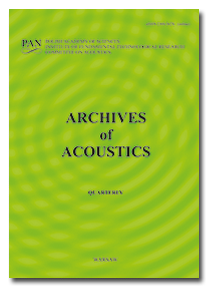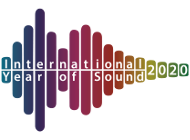10.24425/118087
The Effects of the Noise and Reverberation on the Working Memory Span of Children
References
Baddeley A. (2003), Working memory and language: An overview, Journal of Communication Disorders, 36, 189–208.
Baddeley A.D., Hitch G. (1974), Working memory, Psychology of Learning and Motivation, 8, 47–89.
Beaman C.P., Holt N.J. (2007), Reverberant auditory environments: the effects of multiple echoes on distraction by ‘irrelevant’ speech, Applied Cognitive Psychology, 21, 1077–1090.
Conway A.R.A., Kane M.J., Bunting M.F., Hambrick D.Z., Wilhelm O., Engle R.W. (2005) Working memory span tasks: A methodological review and user’s guide, Psychonomic Bulletin and Review, 12, 5, 769–786.
Dawna E.L., Crystal M.M., Daniel L.V., Nicholas A.S. (2014), Children’s Understanding of Instructions Presented in Noise and Reverberation, American Journal of Audiology, 23, 326–336.
Just M.A., Carpenter P.A. (1992), A capacity theory of comprehension: individual differences in working memory, Psychological Review, 99, 122–129.
Kjellberg A., Ljung R., Hallman D. (2008), Recall of words heard in noise, Applied Cognitive Psychology, 22, 1088–1098.
Klatte M., Bergström K., Lachmann T. (2013), Does noise affect learning? A short review on noise effects on cognitive performance in children, Frontiers in Psychology, 4, 578–589.
Klatte M., Lachmann T., Meis M. (2011), Effects of noise and reverberation on verbal short-term memory in young adults in a classroom-like setting, The 9th Biennial Conference on Environmental Psychology, Eindhoven. Available: http://proceedings.envpsych2011. eu/files/orals.html.
Klatte M., Meis M., Janott C., Hilge C., Schick A. (2002), The effects of the soundfield system on cognitive performance of elementary school children, Proceedings Forum Acousticum, Sevilla, SS-NOI-04.
Larsby B., Hällgren M., Lyxell B., Arlinger S. (2005), Cognitive performance and perceived effort in speech processing tasks: effects of different noise backgrounds in normal-hearing and hearing-impaired, International Journal of Audiology, 44, 131–143.
Ljung R., Israelsson K., Hygge S. (2013), Speech intelligibility and recall of spoken material heard at different signal-to-noise ratios and the role played by working memory capacity, Applied Cognitive Psychology, 27, 198–203.
Ljung R., Kjellberg A. (2009), Long reverberation time decreases recall of spoken information, Building Acoustics, 16, 301–311.
Marrone N., Alt M., DeDe G., Olson S., Shehorn J. (2015), Effects of steady-state noise on verbal working memory in young adults, Journal of Speech, Language, and Hearing Research, 58, 1793–1804.
Perham N., Banbury S., Jones D.M. (2007), Do realistic reverberation levels reduce auditory distraction?, Applied Cognitive Psychology, 21, 839–847.
Pichora-Fuller M.K., Schneider B.A., Daneman M. (1995), How young and old adults listen to and remember speech in noise, The Journal of the Acoustical Society of America, 97, 1, 593–608.
Shang B. (2003), Contemporary child development psychology, pp. 296–310, Shanghai: Shanghai Education Press.
Sorqvist P., Hurtig A., Ljung R., Ronnberg J. (2014), High second-language proficiency protects against the effects of reverberation on listening comprehension, Scandinavian Journal of Psychology, 55, 91–96.
Sullivan J.R., Carrano C., Osman H. (2015), Working memory and speech recognition performance in noise: implications for classroom accommodations, Communication Disorders, Deaf Studies and Hearing Aids, 3, 136–141.
Surprenant A.M. (1999), The effect of noise on memory for spoken syllables, International Journal of Psychology, 34, 328–333.
Tao H. (2015), Effects of noise types and noise sensitivity on working memory and noise annoyance of college students, Disseration, Beijing Forestry University, Beijing.
Turner M.L., Engle R.W. (1989), Is working memory capacity task dependent?, Journal of Memory and Language, 28, 127–154.
Unsworth N., Heitz R.P., Schrock J.C., Engle R.W. (2005), An automated version of the operation span task, Behavior Research Methods, 37, 498–505.
DOI: 10.24425/118087





